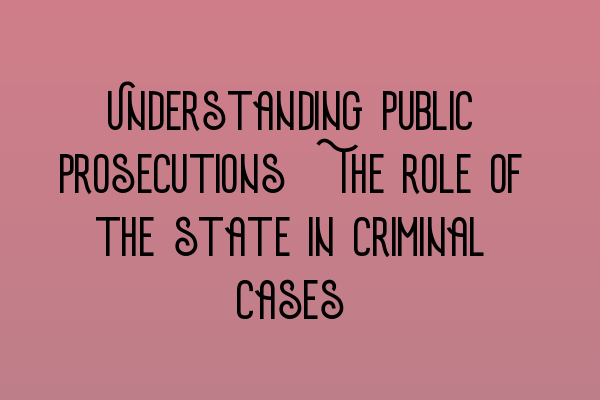Understanding Public Prosecutions: The Role of the State in Criminal Cases
In the criminal justice system, public prosecutions play a pivotal role in upholding the law and ensuring justice is served. When a crime is committed, it is the responsibility of the state to investigate and prosecute the offender in accordance with the law. This article will delve into the intricacies of public prosecutions, highlighting their importance and the various stages involved in bringing a criminal case to court.
The Importance of Public Prosecutions
Public prosecutions serve as a cornerstone of the legal system. They are vital for maintaining law and order in society, as they not only deter potential criminals but also hold offenders accountable for their actions. Through the process of prosecution, the state seeks to uphold justice and protect the rights of both victims and the accused.
The Role of the State
When a crime is committed, the state, represented by the Crown Prosecution Service (CPS) in the UK, assumes the role of the prosecutor. The CPS is an independent body responsible for reviewing police evidence and determining whether there is enough evidence to proceed with a criminal charge. This ensures that the decision to prosecute is based on the merits of the case rather than personal biases.
Once the decision to prosecute is made, the state takes on the responsibility of presenting the case in court. The prosecutor acts on behalf of the state and presents the evidence to the court, aiming to prove the guilt of the accused beyond a reasonable doubt. The role of the state is not only to secure convictions but also to ensure a fair trial and protect the rights of the accused.
The Stages of a Public Prosecution
A public prosecution encompasses several stages, each crucial in ensuring a just outcome. These stages include:
- Investigation: The police conduct an investigation, gathering evidence and interviewing witnesses. This stage is essential to build a strong case against the accused.
- Charging Decision: Once the investigation is complete, the police present their findings to the CPS. The CPS then reviews the evidence and decides whether to charge the accused.
- Pre-trial Preparation: If the accused is charged, the prosecution prepares the case for court. This involves gathering further evidence, interviewing witnesses, and formulating a legal strategy.
- Trial: The trial is the central stage of a public prosecution. Here, the prosecution presents its case, calling witnesses and introducing evidence to support the charges against the accused. The defense has the opportunity to challenge the evidence and present their own case.
- Verdict and Sentencing: After hearing all the evidence, the judge or jury deliberates and delivers a verdict. If the accused is found guilty, they are then sentenced according to the law.
- Appeals: If either party is dissatisfied with the verdict, they may have the right to appeal the decision to a higher court.
Conclusion
Public prosecutions are central to the criminal justice system, ensuring that those who break the law are held accountable for their actions. By understanding the role of the state in criminal cases, we can appreciate the importance of a fair and impartial trial. If you are preparing for the Solicitors Qualifying Examination (SQE) in the UK, make sure to check out our related articles:
- SQE 1 Practice Exam Questions
- SQE 1 Practice Mocks FLK1 FLK2
- SQE 2 Preparation Courses
- SQE 1 Preparation Courses
- SRA SQE Exam Dates
